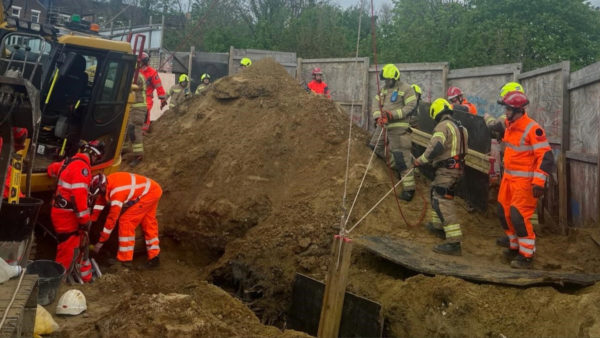
Following Chancellor Rishi Sunak’s second Budget speech, in which he promised a “new age of optimism” and pledged billions of pounds worth of investment to help the economy to recover from covid-19 (see the main points here), figures from across the construction industry gave their reaction:
“Piecemeal funding to address specific issues in the built environment will not provide a solution to the overarching issue of quality, and the assurance of £5bn to remove unsafe cladding must be undertaken by competent and skilled workers. The government has announced the total spending on skills will increase by £3.8bn by 2024-25, however industries such as construction need that support now in order to achieve a competent and skilled workforce that is desperately needed.
“Last week, CIOB welcomed the publication of the Heat and Buildings Strategy as a means of addressing some of the key issues surrounding sustainability in the built environment. However, we’re concerned that the Chancellor did not release further information on how the new funding announced in the Strategy would link with the UK’s ambitions to meet Net Zero targets by 2050. The Heat and Buildings Strategy was a clear indicator of the government’s commitment to decarbonising our homes on the route to Net Zero. However, the £3.9bn pledge for heat pumps is someway short of the government’s £9.2bn manifesto commitment for domestic energy efficiency improvements.
”The Institute is disappointed to see the autumn Budget gave no further clarity on how government intends to meet its manifesto spending commitments to drive to UK towards net zero. Both the Heat and Buildings Strategy and Autumn Budget should have included a greater focus on the need for a clear, long-term, National Retrofit Strategy to address the carbon output of homes whilst also tackling the key issue of quality. CIOB would like to see the government allocate the remaining £5.3bn towards the Construction Leadership Council’s (CLC) National Retrofit Strategy which has been backed by CIOB and many other bodies within the built environment.”
Eddie Tuttle, director of policy, public affairs and research at the Chartered Institute of Building (CIOB)
“Great to hear the Chancellor’s Budget earlier today that declared that we are entering a ‘post-covid age of optimism’ with investment in healthcare, infrastructure and education amongst others. With construction having played its part in Britain’s economy recovery, it was heartening to hear the Chancellor talk aboutthe reduction of the economic scarring of covid and an earlier return to post covid growth levels.
"As part of the Chancellor’s focus on education, the £1.6bn commitment to support vocational training for 16-19 year olds shows now is the time for our industry to invest in skills and make our sector at the forefront of innovation and environmental and societal change. The construction industry isn’t just about constructing buildings, but about supporting societies through creating jobs, driving social mobility and levelling up accessibility, propelling growth and economic resilience in areas of deprivation.”
Andy Reynolds, chief executive and global board director, Rider Levett Bucknall
“We’d have liked to see more about investment in green upskilling, and particularly about increasing our engineering and technical capacity to deliver the transition to a green economy. We remain concerned about the lack of nationwide planning for EV charging points, and critically there was little about encouraging the further decarbonisation of the grid with more renewable energy and by abolishing disproportionate levies on electricity."
Andrew Eldred, director of workforce and public affairs, Electrical Contractors Association (ECA)
“The Chancellor’s message today feels out of sync with the long-term challenges our country faces. Rather than investing in the transition to a low-carbon future, we see significant amounts of money directed towards freezing fuel duty and cutting air passenger duties.
“Additional money for housing, education and infrastructure is all welcome, particularly the focus on investment in new transport provision outside of South East England. But we’re still missing a coherent plan to help us all address climate change and reduce the huge proportion of global carbon emissions generated by the built environment specifically. We’re about to take global centre stage – I hope the Government can be persuaded to change gear.”
Simon Allford, RIBA president
“With numerous policies already unveiled, today’s Budget offered few surprises for industry. While not all new spending, the £5.7bn earmarked for integrated transport settlements for city regions is welcome.
“A disappointing omission from the Chancellor’s speech was any long-term spending decisions around the delivery of larger projects. Long-term projects such as the eastern leg of HS2 and Northern Powerhouse rail are key to boosting the country’s post-covid economy. We hope the much-anticipated Integrated Rail Plan will include a commitment to deliver HS2 in full and provide further clarity around rail plans for the North and Midlands.
“The increase of £44bn for healthcare over the course of this parliament is much needed, and while the government’s continued commitment to its New Hospitals Programme is welcome, more detail around funding is still needed to support the delivery of this vital multi-year capital programme.”
Colin Wood, chief executive, Europe and India, Aecom
“As a business with a significant national footprint, we are particularly buoyed by the Government’s continued focus on levelling up, including a 20% increase in funding for new affordable homes and the 100 local infrastructure projects that will benefit from the levelling up fund.
“The construction industry stands ready to start creating the thousands of new homes the country needs, updating and building hundreds of modern schools and colleges, and the infrastructure required to address some of the longstanding inequalities between north and south. The increase in capital spending for healthcare to £11.2 billion, including to upgrade the existing healthcare estate, will also be crucial in supporting the NHS to achieve its net zero ambitions.
“As an employer focused on the skills needed for the future, we were pleased to see a commitment to a “skills revolution”. The new funding for T-Levels and adult education will help equip the next generation of construction workers with the skills they need to succeed in a post-pandemic net zero economy.”
Stephen Beechey, group public sector director, Wates Group
“The Chancellor’s pledge to launch a £1.4bn Global Britain Investment Fund to attract more overseas investment into sectors such as life sciences, offshore wind and electric vehicle (EV) production will be a welcome boost for commercial and industrial real estate.
“The UK is struggling to attract Gigafactory occupiers against the backdrop of fierce competition across Europe. However, it remains to be seen whether the money allocated as part of the fund will be enough to compete and secure investment in EV vehicle production. On the journey to net zero the UK cannot afford to drag its heels on investment in this space.”
Martin Sudweeks, managing director of cost management, Turner & Townsend
“Today’s announcement on infrastructure spending, on top of government plans to meet its net zero commitments, show it’s critical to invest in construction skills.
“With employers already facing significant skills pressures, we must attract new talent from all areas and upskill the existing workforce.
“Today’s large-scale investments in T levels, maths, Skills Bootcamps and modernising Further Education will provide crucial support on skills and should help to ease pressure on employers looking to recruit and train. Building better pathways into work through traineeships and bootcamps and helping colleges to modernise are key investments. We look forward to building on our work so far to shape these programmes to deliver the skills the industry needs.”
CITB policy director Steve Radley
“While we welcome the Chancellor’s investment in brownfield sites, which will no doubt help the sector meet government quotas to tackle the housing crisis, stronger direction is needed around hard-deadlines and targets for how the construction industry plans to meet net zero target emissions.
“Its plans for a ‘skills revolution’ is also a step in the right direction and a significant investment in digital education will be perfectly timed to tackle the skills shortage the sector urgently needs to address. However, the chancellor should also look to address more immediate crises, such as a solution to materials shortages which isn’t currently hindering significant growth for the sector.”
Richard Waterhouse, spokesperson for NBS









